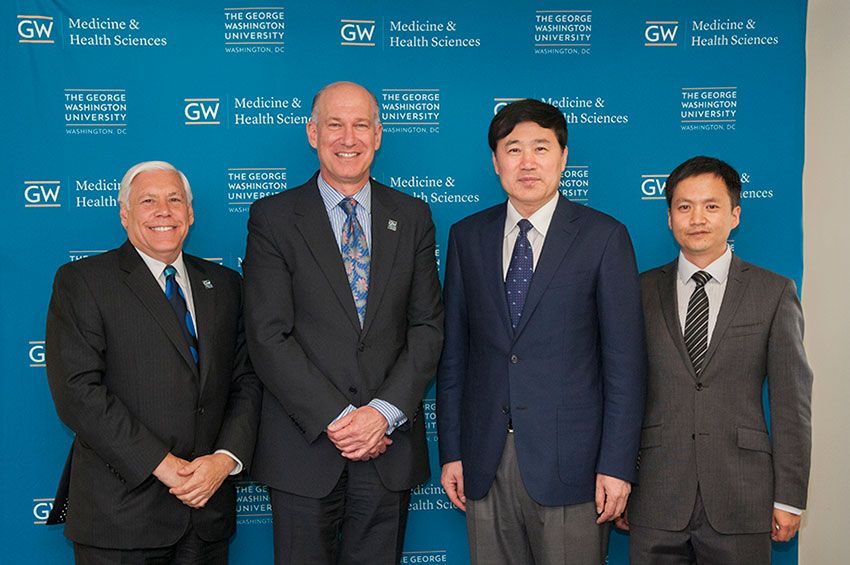
Jeffrey S. Akman, M.D. ’81, RESD ’85, vice president for health affairs at George Washington (GW) University, Walter A. Bloedorn Professor of Administrative Medicine, and dean of the School of Medicine and Health Sciences (SMHS), and Yu-Cun Liu, M.D., Ph.D., president of Peking University First Hospital (PUFH) in Beijing, China, each grasped a pen to sign a Chinese- and English-language document on June 23; the document, a letter of intent, formalized an agreement to pursue collaboration between their institutions for research and education purposes. Akman and Liu smiled, shook hands, and posed for photographs.
Although from different parts of the world, the pair — and their institutions — have much in common. GW Hospital treats members of the upper echelons of Washington, D.C. political society: presidents, vice presidents, legislators, foreign dignitaries, and their family members. PUFH, GW Hospital’s counterpart, does the same, said Peng-Yuan Wang, M.D., assistant president, director of the president’s office, and director of human resources at PUFH. Both leaders are also encouraging international cooperation, a sharing of education and experience, knowledge and skill between the best and brightest of their respective medical spheres. Akman wants to take that support a step further with GW’s international medicine programs and collaborative work and research relationships.
“Our university has a very strong interest in continuing to develop relationships with China,” Akman said at the International Medicine Programs-hosted event. “Our students are interested, and our faculty has developed relationships with faculty, physicians, and scientists in China. It continues to grow.”
The connection between SMHS and China stretches back to 1997, when SMHS physicians participated in training at Drum Tower Hospital in Nanjing, according to Huda Ayas, Ed.D., M.H.S.A., M.B.A., associate dean for international medicine and executive director for the Office of International Medicine Programs. More recently, SMHS and the Peking University Health Science Center in Beijing received funding last year for an international cooperative project; the U.S.-China research and medical team is examining the molecular mechanisms of aspirin-insensitive thrombophilia, a common blood coagulation disorder affecting the members of both countries.
In the past several years, SMHS has also sent several students to study or work in China, and the school recently welcomed its first international Chinese student, one who did not apply to the school as a permanent resident of the United States. “Our goal is to provide training, but with the intent that the person returns to their country with knowledge and skills,” Akman said, adding that graduates of Chinese descent make up the largest percentage of SMHS’s roughly 250,000 alumni.
After the signing, the itinerary included tours of GW’s facilities and GW Hospital. “It’s pretty good,” Wang said for Liu of the day.


